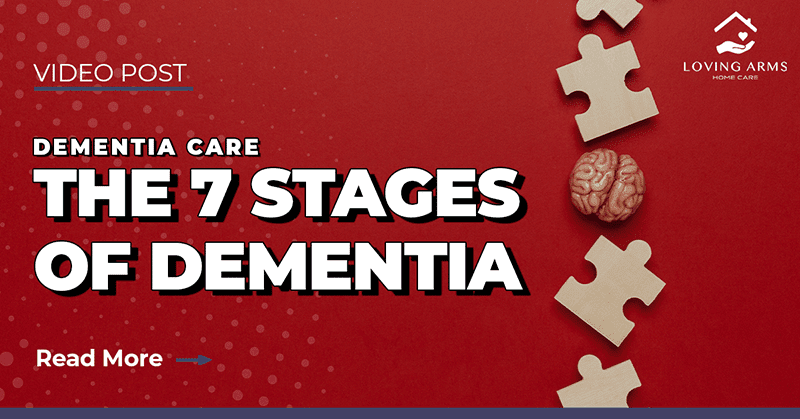The term Dementia is a sort of “umbrella term” for many different types of specific diseases & disorders that result in a decline in mental ability, such as Alzheimer’s Disease.
Because of this, determining what stage of Dementia a loved one is at can be difficult, but today we wanted to provide some information around 7 general stages of dementia as a rough guideline for assessing where your loved one may be along this path.
This can help you determine what level of care may be appropriate, so that you can make an informed care decision that’s right for you, your loved one, and your specific situation.
If you’d rather watch the video version of this blog post, scroll to the bottom or click here.
Stage One: No Impairment
- Symptoms: At this stage, there are not obvious signs of dementia and individuals are still able to function independently. These individuals should be able to function as if not impaired whatsoever, and accomplish all daily tasks such as maintaining a successful career or job, driving themselves safely, preparing meals, enjoying normal social interactions, etc.
- Biological Changes: During this stage, certain biological changes may begin to take place that do not yet result in any obvious symptoms, such as small blood vessel damage in vascular dementia, or an increased presence of certain biomarkers, such as amyloids, throughout the brain.
Stage Two: Very Mild Cognitive Decline
- Symptoms: Minor memory lapses may occur at this stage, such as forgetting common words or the location of day-to-day objects like car keys. These often manifest, and are seen as, normal age-related changes or general forgetfulness.
- Biological Changes: At this stage, biological changes continue to occur and develop, such as amyloid plaques forming, but not yet becoming widespread, in the case of Alzheimer’s Disease.
Stage Three: Mild Cognitive Decline
- Symptoms: At this stage, symptoms become more noticeable and can manifest is a variety of ways, such as a continued difficulty with finding the right words, remembering names, misplacing important objects, and decreased performance at work or with social situations
- Biological Changes: A continuation of existing biological changes that are beginning to accumulate to a significant degree, such as amyloid plaques and tau tangles in Alzheimer’s disease. Very small strokes and other vascular damage in the case of vascular dementia may become more apparent.
Stage Four: Moderate Cognitive Decline (Mild Dementia)
- Symptoms: Symptoms become much more apparent at this stage. Individuals may have trouble with basic math, or recalling recent events. They may also begin to struggle with larger tasks like planning dinners, or managing household finances.
- Biological Changes: Buildup of amyloid plaques and tau tangles in the brain continue to accumulate for some. In those with Alzheimer’s, the hippocampus may begin to noticeably decline, which will impact memory. Vascular damage may be more pronounced in vascular dementia.
Stage Five: Moderately Severe Cognitive Decline (Moderate Dementia)
- Symptoms: This stage is marked by major cognitive function impairment and gaps in memory. Daily activities may become impossible without help, and significant memory impairments such as forgetting one’s own address or phone number can occur, along with general disorientation about time or place. Individuals can have significant trouble with tasks like dressing appropriately.
- Biological Changes: Extensive brain changes, including widespread atrophy in Alzheimer’s disease. Vascular issues in vascular dementia may lead to more widespread brain damage.
Stage 6: Severe Cognitive Decline (Moderately Severe Dementia)
- Symptoms: Memory loss continues to worsen, and is marked by forgetting names of close family members. Extensive help with daily activities is most likely required. Personality and behavior changes can manifest at this stage as well, such as anxiety, obsessive behavior, or general delusions.
- Biological Changes: Atrophy in areas of the brain responsible for memory, language, and reasoning continues to occur in a significant manner. Vascular issues may continue to contribute to brain damage in vascular dementia.
Stage 7: Very Severe Cognitive Decline (Severe Dementia)
- Symptoms: This stage is marked by the need for full-time, 24/7 care. Individuals may lose the ability to respond & interact with their environment, speak, or control their movements. This includes abilities like walking, sitting, or holding their head up. Individuals also may be at higher risk of infections like pneumonia due to weakened immune systems.
- Biological Changes: Severe brain atrophy, including cell death. In Alzheimer’s disease, neural networks within the brain can fail completely and brain tissue shrinkage occurs. White matter lesions and further vascular damage can occur in those with vascular dementia.
Determining Correct Care
We know that watching a loved one’s physical and cognitive can be a heartbreaking situation. That’s why Loving Arms strives to provide the most compassionate, professional care possible, to include handling everyday details and other items so that you don’t have to.
If you’re investigating the right level of care for your loved ones and aren’t sure what you need, please schedule a free in-home consultation with our care providers today, or give us a call at (434) 964-9431 We’ll be able to provide our expert recommendations on how we can help.
If we determine your loved one requires specialized care from others, we can provide recommendations to you one next steps. If we can help, we’ll provide a customized care plan specific to your needs.


The Alzheimer’s Research Center of Albany, led by Alzheimer’s Doctor Richard F. Holub, provides comprehensive services including Alzheimer’s research, clinical trials, and memory disorder treatment in Albany, NY. Rest assured, we are dedicated to supporting you in your journey.